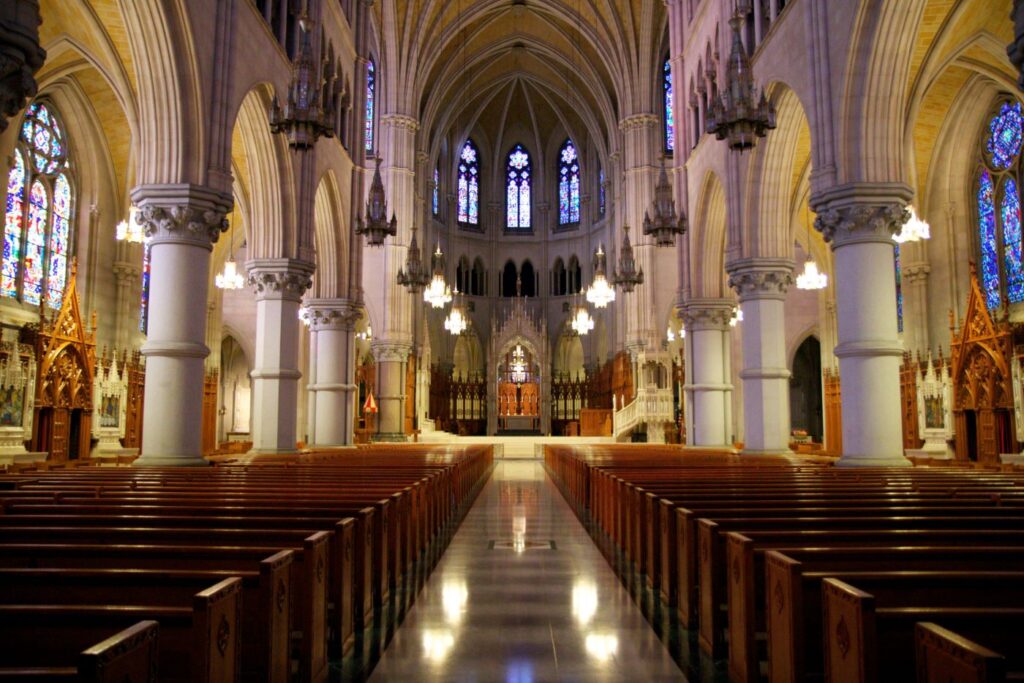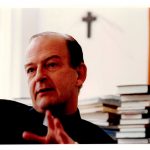Fr. Richard John Neuhaus loved to say that “when we get to heaven, there will be a sign over the pearly gates that reads: ‘The New Jerusalem—From the Wonderful People Who Brought You New York City.’” “And if you didn’t like New York City,” he would impishly add, “there will be another place to go.”
Fifteen years ago today, Fr. Neuhaus left the earthly New York for the heavenly city to which it pointed, leaving in his wake a hole in America’s public discourse. A sui generis activist-turned-intellectual, Neuhaus was, above all, a spiritual father, first as a Lutheran pastor and later as a Catholic priest. It was his ministry—beginning with an inner-city congregation in Brooklyn—that drove his political advocacy and incessant writing on religion and public life. When it came to those matters, President George W. Bush famously said that “Fr. Richard helps me articulate these things.” No Catholic thinker since could claim such praise from a president.
In the intervening years, the political and ecclesiastical landscape has deteriorated in ways Neuhaus could not have fully imagined. And yet his final book, whose publication he did not live to see, offers fitting counsel for us today. American Babylon reminds us what politics is and how Christians should think about their citizenship in this world and the next—about living as a people who are not at home but live in “time toward home.”
In American Babylon and his other works, Neuhaus defined politics as the process by which we deliberate “how we ought to order our life together.” This is more than a paraphrase of Aristotle. First, it teaches that politics is not a matter of philosophical speculation but practical reason. It is not about reaching the right metaphysical conclusions and building a perfect program from them. Rather, politics consists of acting for the good that is possible now, with all the messiness and compromise that might entail.
Start your day with Public Discourse
Sign up and get our daily essays sent straight to your inbox.Despite their disagreements over particular political matters, Neuhaus would have agreed with then-Cardinal Ratzinger when he urged:
The continued existence of pluralistic democracy (that is, the continued existence and development of a humanly possible standard of justice) urgently requires that we have the courage to accept imperfection and learn again to recognize the perpetual endangerment of human affairs. Only those political programs are moral which arouse this courage.
Politics does not require the constant refinement of intellectual diagnoses and ideals, but how best to put our common life in order as it is, warts and all.
Therefore, politics pertains to our life together, here and now, not in the life to come. “The first thing to say about politics,” Neuhaus liked to remind us, “is that politics is not the first thing.” This should chasten our aspirations for politics and clarify its aims. Politics cannot replace our hunger for God, and the perfection for which we long can only be attained in union with him, not through the implementation of a political program. Ratzinger writes that from the beginning, Christianity sets its messianic hopes on Christ, not political action, which belongs to the realm of rationality and ethics. The New Testament’s teachings can lead to political ethics, but not political theology.
Neuhaus made a similar distinction between political theology and a theology of politics. As Matthew Rose notes, “The former invokes theology to justify a political ideology or particular course of action. To Neuhaus, this was idolatrous. The latter offers a theological understanding of politics as a sphere of human life under divine rule and guidance. To Neuhaus, this was a Christian responsibility.”
Neuhaus keenly felt it as his particular vocation as well. For the ordering of our common life requires a moral foundation that precedes politics. Our deliberation can only succeed within a framework, a general consensus about the goodness of human life and its being lived under God. Without this ecumenical acknowledgment of the transcendent source of morality and the dignity of human beings, Neuhaus contended, the American experiment would fail. Hence he famously argued that atheists cannot be good citizens, in the sense that they cannot accept and support the moral framework necessary for political reflection and action. Rose writes that Neuhaus’s goal “was not to replace liberal politics with political religion. It was to replace an unsustainable arrangement of moralities in conflict with a common morality whose deliberations could draw on transcendent meanings.”
Neuhaus himself framed this as advocating against the naked public square in favor of the civil public square:
The alternative to the naked public square—meaning public life stripped of religion and religiously grounded argument—is not the sacred public square, but the civil public square. The sacred public square is located in the New Jerusalem. The best that can be done in Babylon is to maintain, usually with great difficulty, a civil public square.
In the civil public square, all have a right to participate—not only because they are citizens so entitled by this constitutional order, but also, and more fundamentally, because we recognize that they are possessed of a human dignity that cannot be denied without threatening the ever fragile earthly city on which we all depend.
The task of Christians in America is to work for the common good through our deliberative political process and to strengthen that process’s foundations by living out our faith. In a pluralistic society, this inevitably involves compromises and disagreements about the common good, which the procedures of liberal society helped balance. But those procedures can never substitute for some basic social agreement about transcendent authority and the moral truths it provides.
Neuhaus was concerned that the moral relativism of figures such as Richard Rorty would erode the moral language of America’s public deliberation. Today, Rorty is largely forgotten, and many of Neuhaus’s old foes have joined forces with his friends to oppose the new moral code promulgated by the elite. As I noted last year, this is not the pure relativism Neuhaus feared but “a kind of selective moral absolutism” that makes totalizing judgments based on unquestioned criteria. As it turns out, the religious moral language Neuhaus advocated permits and encourages serious moral deliberation in a way its would-be successor does not. It has richer distinctions, traditions, and understanding of history. It knows that killing the innocent is always wrong, and that everything is not slavery or apartheid. Unmoored from its Christian foundation, human dignity has become not more capacious, but less intelligible, our public life more divided, not less.
In his final work, Neuhaus underscored the degree to which Christians engage in politics as exiles. The prophet Jeremiah urged the Jews in Babylon to build houses, plant gardens, marry, and have children, even though they lived in a foreign land: “But seek the welfare of the city where I have sent you into exile, and pray to the Lord on its behalf, for in its welfare you will find your welfare.” As out of place as Christians might feel in America, in its welfare they would find their welfare. “This world,” Neuhaus wrote, “for all its well-earned dissatisfactions, is worthy of our love and allegiance. . . . Our restless discontent takes the form not of complaint but of hope. There is a promise not yet fulfilled. One lives in discontented gratitude for the promise, which is to say one lives in hope.”
Hope was Neuhaus’s great virtue and colored so much of his work. Benjamin Crosby, a young Episcopal priest, recently described ministry as “a work of repair.” By its nature, repair requires a kind of hope to overcome the instinct to discard or tear down and rebuild. Much of Neuhaus’s work was repair of one kind or another: repairing the wounds of America’s racism, repairing the damage inflicted by the extermination of the unborn, and repairing the schisms of the Reformation—first from one side, then from another.
By its nature, repair requires a kind of hope to overcome the instinct to discard or tear down and rebuild.
Of course, hope knows that the complete victory will be eschatological, and still works for victory in the meantime. This is what separates hope from optimism and presumption. In Neuhaus’s words: “Optimism is simply a matter of optics, of seeing what we want to see and not seeing what we don’t want to see. Hope is only hope when it is hope with eyes wide open to all that challenges hope.”
Neuhaus’s hope is the greatest example he gives us today, especially those who feel their status as exiles more keenly than they expected. Fifteen years after his death, Christians have yet to find a more coherent proposal for how to think about political action in their pluralistic society. Neuhaus still proposes a more excellent way between quietist retreat and foolhardy attempts to dominate our fellow citizens (sometimes at the expense of their franchise or human dignity), a way of guiding our political life and strengthening its roots.
Neuhaus was keenly aware of the need for the law to coerce toward the good, inside and outside the Church. At the same time, he adhered to Origen’s maxim: “Christ triumphs over no one unless he himself wants it. He triumphs only by convincing: for he is the Word of God.” Riffing on John Paul II in his preaching, he would say again and again, “The Church never imposes; she only proposes. And how does she propose? Winsomely, persuasively, and persistently, like a lover to the beloved.”
There will never be a time when we can stop trying to convince our fellow citizens of the truth of the gospel and its political implications. As he wrote in the conclusion of American Babylon, ours is “a time for persistence in reasoned argument, never tiring in proposing to the world a more excellent way; a time for generosity toward those who would make us their enemy.” It is a time when we should be grateful for the good that remains in America and work toward its improvement, while remembering that we still live within “time toward home.”
Image by “jesus” and licensed via Adobe Stock. Image resized.














